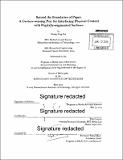Beyond the boundaries of paper : a gesture-sensing pen for interfacing physical content with digitally-augmented surfaces
Author(s)
Pao, Sheng-Ying (Sheng-Ying Aithne)
DownloadFull printable version (13.25Mb)
Alternative title
Gesture-sensing pen for interfacing physical content with digitally-augmented surfaces
Other Contributors
Massachusetts Institute of Technology. Department of Architecture. Program in Media Arts and Sciences.
Advisor
Kent Larson.
Terms of use
Metadata
Show full item recordAbstract
Humans are inherently creative and we have the desire to express and communicate. Pen and paper have been effective means of creation, expression, and communication for centuries. Today, technology increasingly permeates our environment but the spread of digital displays makes us more susceptible to passive viewership. What if we could combine the benefits of technology and pen and paper to empower people to become more active creators? This thesis explores new affordances for pens that become an interface to transcend the boundaries of paper through a series of gesture interactions that a) transfer content from the surface of creation (i.e., paper) onto surface of attention (i.e., intended surfaces in the immediate or remote locations); b) enable dynamic interactions across time by allowing users to create and transform static drawings on paper into an animated expression; c) maintain privacy for content creation while allowing users to selectively share only chosen content in real-time; d) explore the impact of gesture embodiment on audience engagement and shift their perspectives from being passive viewers to active creators. A series of usability studies were designed and conducted to evaluate the platforms and to explore how people may expand physical content beyond the boundaries of paper with the system. Beyond laboratory development, this thesis also presents the real-world deployment of the gesture-sensing pen as an interactive installation in a museum exhibition. Potential applications range from collaborative workspaces to participatory art experiences. Issues relating to creative process, sharing and privacy, and usability are examined in light of the interactive nature of the system.
Description
Thesis: Ph. D., Massachusetts Institute of Technology, School of Architecture and Planning, Program in Media Arts and Sciences, 2015. Page 188 blank. Cataloged from PDF version of thesis. Includes bibliographical references (pages 159-165).
Date issued
2015Department
Program in Media Arts and Sciences (Massachusetts Institute of Technology)Publisher
Massachusetts Institute of Technology
Keywords
Architecture. Program in Media Arts and Sciences.